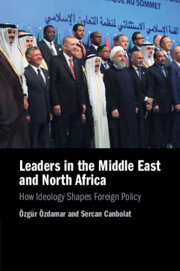Book contents
- Leaders in the Middle East and North Africa
- Leaders in the Middle East and North Africa
- Copyright page
- Contents
- Figures
- Tables
- Abbreviations
- 1 Political Ideology and Foreign Policy Decision-Making in the Middle East and North Africa
- 2 Political Islam and Sunni Ideology
- 3 Political Islam and Shia Ideology
- 4 Secularist Leaders in the Levant
- 5 Armed Nonstate Actors’ Foreign Policy
- 6 Leaders, Foreign Policy Decision-Making, and International Relations
- 7 Policy Implications and Future Research
- Bibliography
- Index
3 - Political Islam and Shia Ideology
Iranian and Iraqi Leadership
Published online by Cambridge University Press: 03 August 2023
- Leaders in the Middle East and North Africa
- Leaders in the Middle East and North Africa
- Copyright page
- Contents
- Figures
- Tables
- Abbreviations
- 1 Political Ideology and Foreign Policy Decision-Making in the Middle East and North Africa
- 2 Political Islam and Sunni Ideology
- 3 Political Islam and Shia Ideology
- 4 Secularist Leaders in the Levant
- 5 Armed Nonstate Actors’ Foreign Policy
- 6 Leaders, Foreign Policy Decision-Making, and International Relations
- 7 Policy Implications and Future Research
- Bibliography
- Index
Summary
In the third chapter, the authors discuss the origins and evolution of the Shia political Islam with a focus on the Iranian Revolution of 1979 and the Ayatollahs’ revolutionary vision which aimed to export the Iranian political-religious model to other countries. This chapter gives an overview of the psycho-biographies of influential Shia leaders: Ali Khamenei, Hassan Rouhani, Ali al-Sistani, and Nouri al-Maliki. The authors discuss the operational code analysis results and deliberate on what kind of generic foreign policy behavior and strategies we should expect from Shia political Islamist leaders. The chapter also sheds light on what these results and strategies mean for the MENA politics and consider the implications of this analysis for Iran’s relations with the United States, the EU, and regional powers; Iraq’s foreign relations; and the future of Iraq as a viable power in regional politics. The authors conclude by discussing what these results mean for foreign policy decision-making and the international relations discipline.
Keywords
- Type
- Chapter
- Information
- Leaders in the Middle East and North AfricaHow Ideology Shapes Foreign Policy, pp. 49 - 75Publisher: Cambridge University PressPrint publication year: 2023

